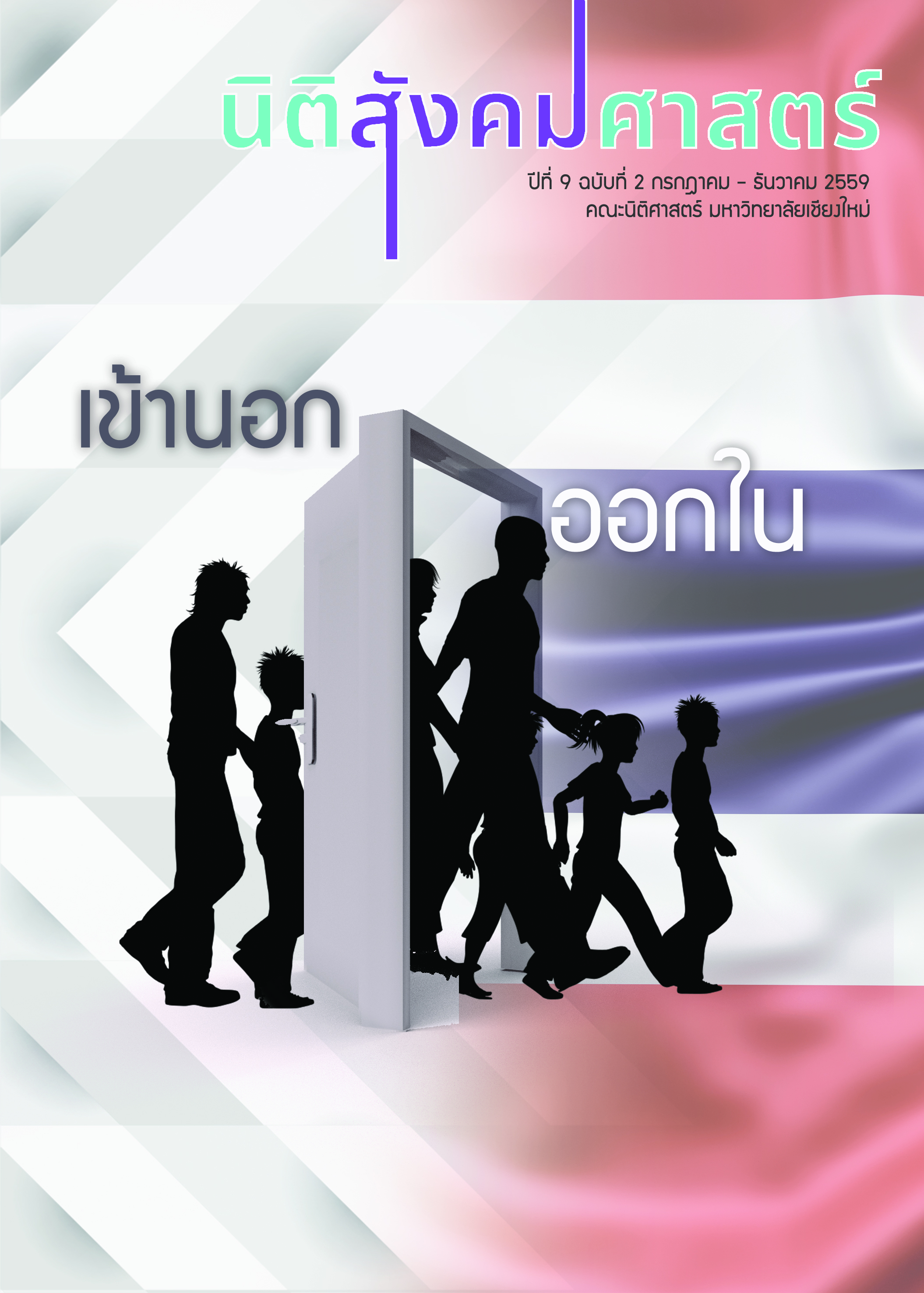ปัญหาการตีความ “การแสวงหาประโยชน์” ในความผิดฐาน ค้ามนุษย์ กรณีกลุ่มผู้อพยพชาวโรฮิงญาในประเทศไทย Problems in the Interpretation of ‘Exploitation’ in the Trafficking Case of Rohingya Migrants in Thailand
Main Article Content
บทคัดย่อ
ผู้อพยพชาวโรฮิงญาที่เดินทางเข้ามาในประเทศไทยอย่างผิดกฎหมายโดย
มีผู้นำพาเข้ามา เมื่อปรากฏเงื่อนไขอันอาจพิจารณาได้ว่าเป็นองค์ประกอบของความ
ผิดฐานค้ามนุษย์เกิดขึ้นในระหว่างการเดินทางนั้น อาจทำให้การลักลอบขนผู้โยก
ย้ายถิ่นดังกล่าวเป็นการค้ามนุษย์ได้ อย่างไรก็ตามปัญหาประการหนึ่งที่เกิดขึ้นใน
การบังคับใช้กฎหมายเกี่ยวกับการค้ามนุษย์ คือ ปัญหาการตีความองค์ประกอบของ
ความผิดฐานค้ามนุษย์โดยเฉพาะในส่วนของการแสวงหาประโยชน์จากเหยื่อการ
ค้ามนุษย์ บทความชิ้นนี้มุ่งศึกษาแนวทางการตีความการแสวงหาประโยชน์จาก
เหยื่อการค้ามนุษย์ในกลุ่มผู้อพยพชาวโรฮิงญาในประเทศไทย โดยจะเน้นที่ลักษณะ
การขูดรีด การเอาคนลงเป็นทาส และแรงงานบังคับ
For the Rohingya Migrants travelling in an irregular situation
to Thailand with brokers, when the elements of trafficking in persons
occur, the people smuggling could become a human trafficking
case. However, one significant problem is the interpretation of the
‘exploitation’ to the trafficked victims. This paper aims to study the
interpretation of the exploitation in human trafficking cases in Thailand
with focus on the Rohingya migrants. The paper will focus on some
types of the exploitation as the extortion, slavery and forced labour.
Article Details
O ความคิดเห็นใดๆ ที่ลงตีพิมพ์ใน CMU Journal of Law and Social Sciences เป็นของผู้เขียน (ความคิดเห็นใดๆ ของผู้เขียน กองบรรณาธิการ CMU Journal of Law and Social Sciences ไม่จำเป็นต้องเห็นด้วย)
O กองบรรณาธิการ CMU Journal of Law and Social Sciences ไม่สงวนสิทธิ์ในการคัดลอกแต่ให้อ้างอิงแหล่งที่มาด้วย
เอกสารอ้างอิง
มูลนิธิเพื่อสิทธิมนุษยชนและการพัฒนา. (2557). คู่มือเรื่อง ทบทวนข้อกฎหมายและการจัดการของรัฐไทยภายใต้พันธกรณีระหว่างประเทศและกฎหมายภายใน กรณีศึกษาแนวทางการใช้ความช่วยเหลือแก่กลุ่มโรฮิงญาจำนวน 5 คนในพื้นที่จังหวัดสงขลา. กรุงเทพ: มูลนิธิสิทธิมนุษยชนและการพัฒนา.
International Labour Organization Special Action Programme to Combat Forced Labour, Trafficking in persons and Forced Labour Exploitation, Guidelines for Legislation and Law Enforcement, Geneva: Internatioanl Labour Organization, 2005.
Recommended Principles and Guidelines on Human Rights and Trafficking in persons, Text presented to the Economic and Social Council as an addendum to the report of the United Nations High Commissioner for Human Rights (E/2002/68/Add. https://www.unodc.org/cld/case-law-doc/traffickingpersonscrimetype/tha/2013/samaesan.html?lng=en&tmpl=htms
Report of the Special Rapporteur on trafficking in persons, especially women and children, Maria Grazia Giammarinaro, A/HR 1), Retrieved June 26, 2016, from
C/29/38/Add.1, Human Rights Council, Twenty-ninth session, June 2015, Agenda item 3, Promotion and protection of all human rights, civil, political, economic, social and cultural rights, including the right to development, Addendum, Mission to Malaysia.
Sentencing Judgement in the Kunarac, Kovac and Vukovic (Foca) Case, The Hague, 12 June 2002, CVO/ P.I.S./679-E, The International Criminal Tribunal for the former Yugoslavia (ICTY), http://www.icty.org/en/press/sentencing-judgement-kunarac-kovac-and-vukovic-foca-case
Testimony of Matthew Smith, Executive Director of Fortify Rights, House Committee of Foreign Affairs, Subcommittee on A
Testimony of Matthew Smith, Executive Director of Fortify Rights, House Committee of Foreign Affairs, Subcommittee on Africa, Global Health, Global Human Rights, and International Organizations, “Accountability and Transformation: Tier Rankings in the Fight against Trafficking in persons” on April 22, 2015.
United Nations Office of Human Rights Commissioner, Human Rights and Trafficking in persons, Fact Sheet No. 36, the United Nations: New York and Geneva, 2014.
United Nations Office on Drug and Crime, Issue Paper, the Concept of ‘Exploitation’ in the Trafficking in Persons Protocol, Vienna: United Nations, 2015.
บรรณานุกรมที่แปลเป็นภาษาอังกฤษ
Human Rights and Development Foundation. (2014). Review of Law and Management of the Thai State under Obligation of International and Domestic laws: Case Study of Assistance to Five Rohingyas in Songkhla Province. Bangkok: Human Rights and Development Foundation. (in Thai)

